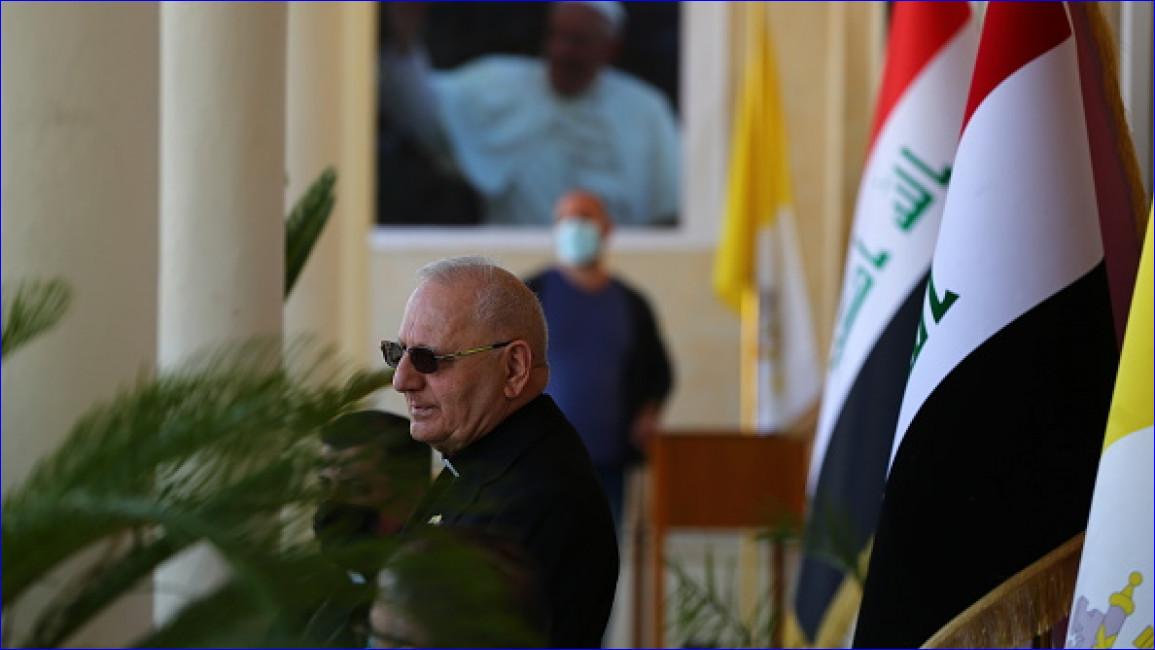


In a message posted on the church's official website on Saturday evening, Cardinal Louis Raphael Sako accused the Iraqi state of marginalising the country's Christian minority.
Most of Iraq's Christians have fled the country since the 2003 US-led invasion, in part due to a proliferation in extremist groups.
"Christians have their legitimate human and national rights violated, and are being excluded from their jobs, and their capabilities and properties are being seized, in addition to the systematic demographic change of their towns in the Nineveh Plain before the eyes of the Iraqi state," the patriarch said.
Related: Timeline of ISIS in Iraq
Related: Attacks on Assyrians in Syria By ISIS and Other Muslim Groups
"One million Christians left Iraq after 2003, and after IS [Islamic State group] members displaced the Christians of Mosul and the towns of the Nineveh Plain in 2014, for security, political, economic, and social reasons."
IS seized large swathes of territory in northern and western Iraq, proclaiming an unrecognised Islamic caliphate which included parts of Syria, before its defeat in 2017.
Although these regions have been liberated, Iraqi Christians still face major hurdles including the dominance of militias and the failure of successive governments to rebuild their towns.
Christians today account for less than one percent of Iraq's roughly 44 million population, the patriarch said. Chaldeans - alongside Assyrians and Syriacs - make up the biggest Christian denominations in the country.
Before the US-led invasion and the fall of dictator Saddam Hussein, Christians were believed to number between 1.5 and 2 million. Many fled to Lebanon and Jordan, or abroad to Europe, North America, and Australia.
"About 1,200 Christians were killed in multiple violent incidents throughout Iraq in the period between 2003 and 2018, including 700 people who were killed based on their identity, and a number of clerics were kidnapped in Mosul and Baghdad, and a number of them were killed, most notably Bishop Boulos Faraj Rahho, the Chaldean Archbishop of Mosul," Sako said, according to the message published on the website.
He added that 85 churches and monasteries in Baghdad, Mosul, and Basra were bombed by extremists including IS, as well as the seizure of 23,000 Christian homes and other private properties, while many were forced out of their jobs.
"The Christian quota was hijacked in the parliamentary elections, Christians have lost confidence in the improvement of their situation, due to these violations and the consequences of the Personal Status Law," he said.
Since 2003, Iraq has by convention been governed by a sectarian power-sharing system where the president (whose position is largely ceremonial) is a Kurd and the prime minister and parliament speaker are Shia and Sunni Arabs respectively.
In this confessional-based system, Christians and other minorities have had little representation.
"The percentage of Christians decreased from 4 percent to about 1 percent," Patriarch Sako said, suggesting that "the migration trend and the departure of young people will continue due to their exclusion from jobs for flimsy reasons".
He said equality in law is the key to tackling the exodus of Christians from Iraq.
In early July, Iraqi President Abdul Latif Rashid cancelled a 2013 decree officially recognising Sako as head of the Chaldean Church, which was essential for administering the community's endowment.
In response, Sako said he would withdraw from the seat of the patriarchate in Baghdad and instead settle at one of the monasteries in the autonomous Kurdistan region in northern Iraq.
The Chaldean patriarch has also been embroiled in a war of words with Christian lawmaker Rayan Al-Kildani for months.
Kildani heads the Babylon Movement, whose armed wing is part of Al-Hashd Al-Shaabi - a network of largely Iranian-backed paramilitaries which have official recognition from the Iraqi state.
In a country ravaged by repeated conflicts and plagued by endemic corruption, Sako and Kildani have accused each other of illegally seizing Christian-owned properties.
Kildani, who has been under US sanctions since 2019, accuses the cardinal of assuming a political role beyond his religious mandate.

or register to post a comment.